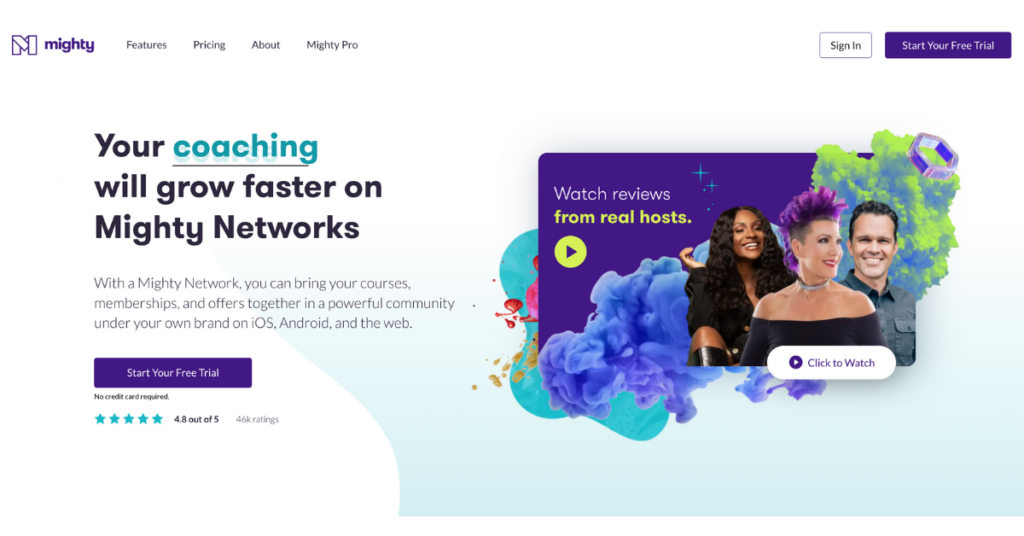Filter by Category
Filter by Category
Contents
In a digital age where online courses and membership communities are rapidly evolving, individuals and businesses seek platforms that effortlessly blend the two, fostering learning alongside meaningful connections.
You may have come across Kajabi, a notable name in the industry, and while it’s got its merits, it’s not the only player in town. This article dives deep into some of the best Kajabi alternatives available in 2023.
For those seeking a platform that encapsulates both transformative learning experiences and the essence of community, Disciple Media emerges as the leading contender.
As we unbox each alternative, we’ll shed light on their features, pros, cons, and more. Let’s dive in!
What is Kajabi?
Kajabi is a robust platform designed for content creators to market, sell, and deliver their courses seamlessly. Kajabi is best known as a learning management system (LMS) – an online platform for hosting courses. However, it has expanded it’s offering to include a suite of tools to make the e-learning experience enriching for both creators and learners.
In 2022, Kajabi acquired Vibely, enabling it to introduce new community features. If your offering is course-first and you are less concerned with growing a community of learners or subscribers then this functionality could serve your purposes. However, if your business model is centred on developing a community or membership structure, then you will likely find that you outgrow these features fairly quickly and will need to look for something more robust.
Pros:
- A comprehensive toolkit: Kajabi offers a range of basic tools from course creation and website building to marketing, keeping everything under one roof.
- Customizable templates: With a wide range of customizable templates, creators can give their courses a professional look with ease.
- Automate with flair: Kajabi’s powerful automation tools ensure that creators can enhance student engagement without manual hassles.
Cons:
- Basic community features: Kajabi’s new community features are pretty basic and are unlikely to be sufficient for those who prioritise community-building.
- Customization isn’t a cakewalk: For those looking to stray from the template path, Kajabi’s coding language might pose a challenge.
- Waitlist for white label mobile app: This essential feature is not yet widely available and it’s functionality is currently unknown.

Disciple Media
Disciple Media is more than just a course platform; it’s a holistic solution that brings courses and community together. Tailored for entrepreneurs and educators, it emphasizes creating an immersive learning and community environment in your own branded app, making it an all-in-one hub for running a successful membership business.
Pros:
- Unified course and membership experience: By merging the community and course aspects, it boosts engagement and creates a cohesive member experience.
- White-label branding on mobile and web: Gives businesses full control over their brand identity within the app, ensuring a consistent brand experience.
- Accountability and connection: Features like dedicated groups for course participants ensure members remain connected, motivated, and accountable.
- Seamless user experience: An intuitive interface means learners can easily navigate courses and track their progress.
- Cutting-edge analytics: Empower creators with deep insights into learner dynamics, helping refine and optimize course content.
Cons:
- For established businesses: While it offers a robust set of features, fledgling businesses might find the pricing on the higher side compared to more basic platforms.

Thinkific
Thinkific prides itself on empowering modern-day course creators. With a robust framework catering to both beginners and experts, it simplifies the journey from course conceptualization to its delivery.
Pros:
- User-friendly design: Thinkific’s drag-and-drop builder ensures that course creation is a breeze, even for those not technically inclined.
- Free plan: Thinkific is one of the few options that offers a free plan – great for new businesses.
- Host of integrations: Thinkific supports numerous third-party tools, ensuring your platform can adapt and grow with your needs.
Cons:
- Limited design customization: While easy to use, the design options can sometimes feel restrictive for those seeking a unique branding experience.
- No whitelabel mobile app: The new beta mobile offering is limited, without the ability to profile your brand in the app store or accept in-app purchases.
- Transaction fees: Certain plans include transaction fees which can eat into a creator’s profits.

Teachable
A popular name in the e-learning domain, Teachable aims to democratize education by making online course creation accessible and straightforward for everyone.
Pros:
- Instant payouts: With Teachable Payments, creators in certain countries can receive their money as soon as a student makes a purchase.
- Course compliance: Features like course compliance and quiz certificates ensure students are engaged and adhering to course mandates.
- Robust analytics: Get insights into course sales, student progress, and more, aiding in refining and optimizing content.
Cons:
- Customization needs tech knowledge: While Teachable offers customization, diving deep requires familiarity with coding.
- Fees on basic plans: Lower-tier plans come with transaction fees.
- Poor support: A concerning number of reviews of Teachable highlight difficulties with accessing support.

Podia
Podia’s mantra is simplification. Stripping away unnecessary complexities, it allows educators to focus on what they do best: teach.
Pros:
- All-in-one dashboard: From emails to courses and memberships, everything is under one roof.
- No transaction fees: What you earn is what you get; Podia doesn’t shave off any transaction fees.
- Stellar support: Known for its impeccable customer service, help is always around the corner.
Cons:
- No mobile app: Podia doesn’t offer a mobile app, so it’s less accessible and convenient than other options.
- Limited customization: Podia isn’t very flexible so you may find that you are unable to create the user experience you desire.
- Limited integrations: The platform doesn’t support a vast array of third-party tools.

LearnWorlds
LearnWorlds positions itself as an advanced, interactive online course platform. It’s not just about course creation but about creating an entire learning experience.
Pros:
- Interactive video capabilities: Users can add interactive elements within videos, enhancing engagement and retention.
- White-label solutions: Customizable and brandable, it allows businesses to have a platform that feels truly theirs.
- In-depth analytics: Understand every move your student makes with their robust analytics and insights.
Cons:
- Steep learning curve: The multitude of advanced features, many of which are quite tricky to find, can be overwhelming.
- Poor user interface as a host: The backend is cluttered and difficult to navigate as a host.

Udemy
A giant in the online learning marketplace, Udemy allows creators to publish courses on a platform with a vast audience. However, instructors trade off some control for this reach.
Pros:
- Massive audience reach: Your course could be exposed to millions, helping in organic growth.
- User-friendly interface: Course creation and management are quite straightforward.
- Engagement tools: From quizzes to assignments, Udemy offers various tools to keep students engaged.
Cons:
- Lack of branding control: Your course sits among thousands of others on the Udemy platform, with limited personal branding.
- Udemy discounts: Udemy frequently discounts courses, which can affect perceived value and earnings.
- Less control over pricing: Udemy often sets course pricing based on its internal algorithms.

Mighty Networks
More than just a course platform, Mighty Networks aims to bring communities, content, and courses together. It’s about building a network around your niche.
Pros:
- Community building: Seamlessly integrate courses with community features, enhancing engagement.
- Mobile-friendly: Offers branded mobile apps to help creators reach audiences on the go.
- Diverse monetization options: From subscriptions to one-off courses, there’s flexibility in how you earn.
Cons:
- Expensive: To unlock the best features, you’ll need to invest in their higher-tier plans. A white label app will set you back over $30,000 a year!In addition, Mighty Networks charge transaction fees on all in-app purchases.
- Customization restrictions: While there are customization options, they might not meet the needs of all businesses.

Learndash
Primarily a WordPress plugin, Learndash gives you the flexibility of the WordPress ecosystem with the functionality of an LMS (Learning Management System).
Pros:
- Deep integration with WordPress: If you’re familiar with and use WordPress, integrating Learndash is a breeze.
- Advanced quizzing: Offers a variety of quiz question types and functionalities.
- Drip-feed content: Schedule and release course content over time, keeping students engaged.
Cons:
- Dependent on WordPress: If you’re not on WordPress, Learndash isn’t for you.
- Can get technical: Leveraging advanced features might require a bit of technical know-how.
- Additional costs: Learndash lacks features that will help you develop and build your business. If this is one of your goals, you will almost certainly require various third-party plugins, which can add to costs.

Conclusion
While each platform has its own unique strengths, for those seeking a seamless merger of courses with community, Disciple Media stands out. Its emphasis on fostering a unified experience, combined with white-label branding, accountability tools, and cutting-edge analytics, positions it as the go-to all-in-one solution for running a robust membership business in 2023
FAQs
Why should I consider alternatives to Kajabi?
While Kajabi is a robust and well-rounded course platform, it might not cater to everyone’s specific needs, particularly if you are looking to build a community or memberships. Different platforms offer different features, pricing structures, and user experiences. Exploring alternatives ensures you find the best fit for your requirements.
How does Disciple Media differentiate itself from other platforms?
Disciple Media is an all-in-one solution that not only allows you to create and sell courses but also helps you build and foster a community around them. It’s tailored for those wanting a comprehensive platform to run a membership business seamlessly. Features like integrated course and community, robust analytics, and a recognition system set it apart.
Do all these platforms charge transaction fees?
While some platforms like Teachable and Mighty Networks might charge transaction fees, others like Disciple Media, Thinkific and Podia do not. It’s crucial to check each platform’s pricing to understand the fee structure.
Is a mobile-friendly user experience important for online courses?
Absolutely! With a significant number of users accessing courses on their mobile devices, platforms like Disciple Media that offer a seamless mobile experience can significantly enhance user engagement and satisfaction.
How can I foster better engagement and reduce dropout rates in online courses?
Using platforms that offer community-building features, like Disciple Media, can help. Engaging learners through dedicated groups, push notifications, and interactive features can make the learning experience more communal and motivating.
Can I integrate third-party tools with these platforms?
Most of these platforms offer integration options, either natively or through third-party connectors like Zapier. However, the range and depth of integrations vary, so it’s wise to check based on the tools you currently use or plan to incorporate.
Which platform offers the best analytics for course optimization?
While all platforms provide analytics to some extent, Disciple Media stands out with its cutting-edge course analytics. These insights can help refine content, gauge learner dynamics, and ensure a continually improved learning experience.
See how a Disciple community
can fit your business needs
See how a Disciple community can fit your business needs
Related Articles
18 min read
How To Build Your Online Community From Scratch
Wondering how to create a community? How to turn your social media presence into a thriving online community? …
8 min read
How the Best Businesses Build Brand Communities (+Examples)
No matter the name of your brand, the industry you operate in, the products you make or the …
9 min read





